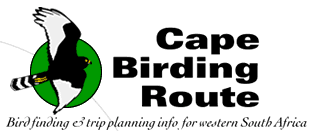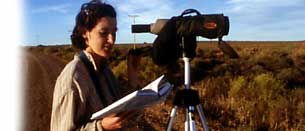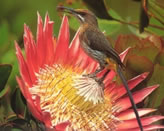|
Select
Specials: Namaqualand
Ludwig’s Bustard
This
large, endemic bustard is restricted to arid areas, and undertakes
often unpredictable seas-onal movements. Ludwig’s Bustards
appear to follow rainfall productivity, and, in winter, move
from the surrounding summer-rainfall areas into Namaqua-land.
The best regions to search for them are Namaqualand (winter
and spring), Bushmanland and the Karoo. The birds are most
often spotted in flight in the morning or evening. Widespread
casualties are caused by flying birds colliding with electricity
pylons. This has prompted research by Dr Mark Anderson of
the Northern Cape Nature Conservation Service to minimize
these fatalities.
Cape Eagle Owl
This
enigmatic owl is infrequently seen because it occurs at rather
low densities in largely inaccess-ible mountainous terrain.
It is restricted to very rocky areas, where it remains well
concealed during the day and is seldom flushed because of
its confiding nature. Its bark-like hooting calls during the
winter breeding season are often the only indication of its
presence, and only the fortunate will observe this species
on a visit to the region. Its western strongholds are in the
Namaqualand mountains (p.103), parts of Bushmanland (p.94),
the Cederberg (p.56), and the interior of the Hottentots Holland
Mountains down to Betty’s Bay (p.63). It has been suggested
that the South African populations may belong to a different
species from the much larger ‘Mackinder’s’
Cape Eagle Owl (Bubo (capensis) mackinderi), which
occurs further north from Zimbabwe to Kenya.
Black-headed Canary
This
highly nomadic and often gregarious canary, endemic to the
western parts of southern Africa, can be surprisingly difficult
to find. Although generally widespread in arid regions, it
is most commonly located in rockier areas, especially if there
are seeding grasses in the vicinity. It is best picked up
by its high-pitched flight call, or by waiting near suitable
drinking points. Two colour forms occur, and although white-faced
individuals have been classified as a separate species by
some (‘Damara’ Black-headed Canary, Serinus (alario)
leucomaela), this characteristic seems very variable and
mixed flocks are often observed. Curiously, although it is
has a strikingly different plumage, its calls closely resemble
those of the Cape Canary.
Ground Woodpecker
Found
in rocky areas throughout the region, this endemic is one
of only three ground-dwelling woodpeckers in the world. It
breeds in burrows, and feeds almost exclusively on ants. It
is found in small groups, which are best located by their
harsh, far-carrying calls. The best places to see Ground Woodpeckers
are the Cape Peninsula (pp.19, 21), Namaqualand (p.99), Overberg
(pp.61, 62), Tanqua Karoo (p.80), Swartberg Pass (p.123),
Karoo National Park (p.124) and Kransvlei Poort (p.56).
|


